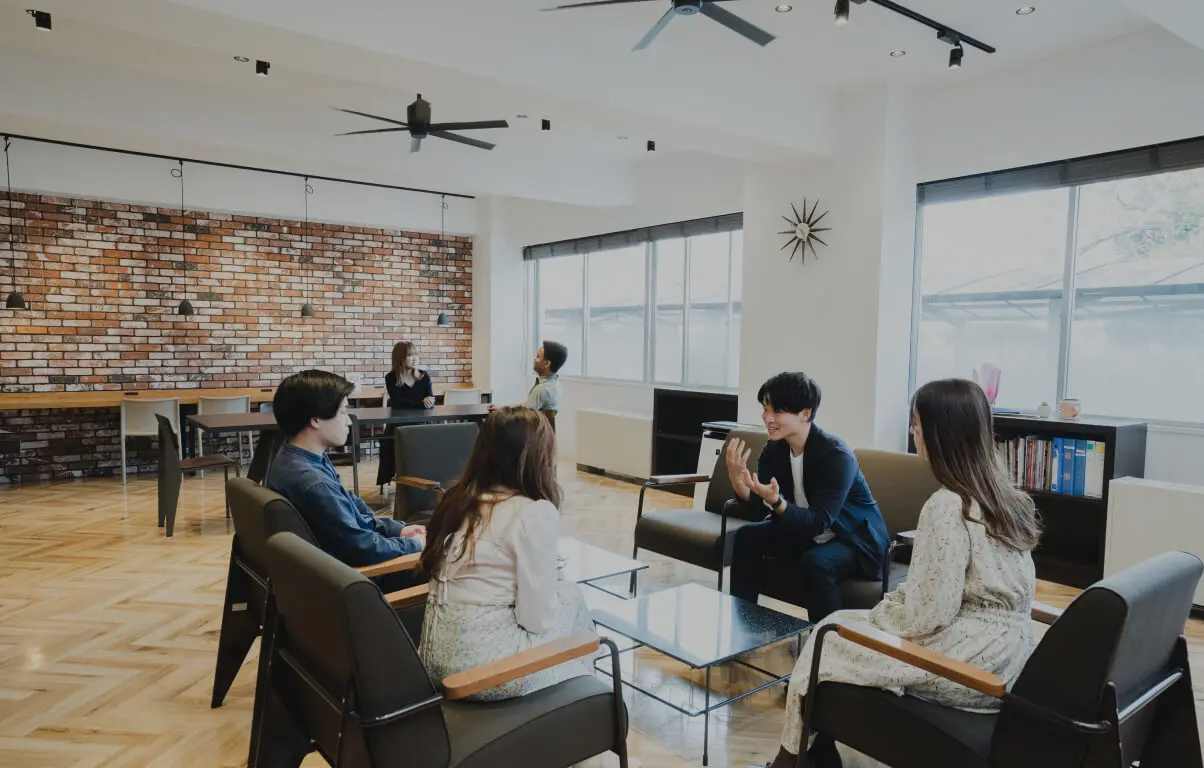<Entering graduate school>
Karina Kilibayeva
Completed Global Studies at Sophia University Graduate School in 2024
Graduated from the School of International Liberal Arts of MIU in 2022
Nationality: Kazakhstan
<Admitted to Sophia University Graduate School>
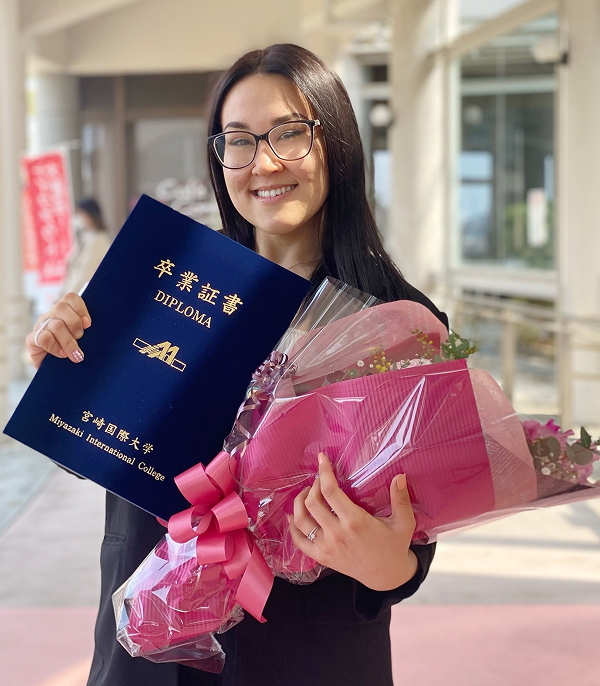
Entering graduate school after graduating from MIU
After graduating from high school, I moved to Tokyo to attend a language school. I was later accepted to both Miyazaki International University and Yokohama National University. I chose Miyazaki International University because I wanted to explore the Kyushu area—a decision that turned out to be one of the best I’ve ever made. My first year at MIU was a wonderful experience filled with new friendships and vibrant campus life.
Unfortunately, during my second and third years, the COVID-19 pandemic hit, and our classes shifted online. It was a difficult time, but I was fortunate to have supportive professors and a part-time job that helped me stay grounded. Despite the challenges, our professors remained dedicated, offering one-on-one support when needed and ensuring our classes continued in an engaging and thoughtful manner.
In my third year, I decided to pursue a master’s degree and return to Tokyo, where I believed my multilingual skills would open more opportunities. I was accepted to both Sophia University and Ritsumeikan University. I ultimately chose Sophia University, thanks in part to the strong academic support I received at MIU, which helped me improve my GPA and prepare a solid senior thesis.
I studied at Sophia University from 2022 to 2024 and greatly enjoyed the experience. In 2024, I joined Arigato Travel, where I now apply my academic background and international perspective to support and enhance our guests’ travel experiences in Japan.
In Japan since 2016 so it’s 9 years now! Currently I work in a travel agency Arigato Travel KK.

Why did you choose to go to graduate school ? What was your research ?
I enrolled in the Graduate School of Global Studies at Sophia University, within the Department of Global Studies. My research focused on the issue of wartime sexual slavery, using a comparative approach between the Yugoslav Wars and the case of the “Comfort Women” in Asia. Through this study, I aimed to explore how sexual violence during conflict has been addressed through historical narratives, transitional justice mechanisms, and public memory.
One of the main reasons I chose Sophia University was the opportunity to work under Professor Nakano Koichi, whose research aligns closely with my academic interests in political history and human rights. I was introduced to his work by my undergraduate advisor, Professor Felix Jimenez Botta at MIC, who encouraged me to pursue further study under Professor Nakano’s guidance.
Additionally, Sophia University’s vibrant international environment was a significant factor in my decision. The university’s diverse student body and bilingual academic offerings provided an ideal setting for engaging in cross-cultural dialogue and sharing global perspectives—both essential elements for research in global studies.
What was the most valuable thing you learned at MIU? How has it benefited you in graduate school and your current life ?
One of the most valuable things I learned at MIU was the importance of history, politics, and critical thinking. These three areas not only shaped my academic foundation but also proved essential during graduate school and my job search. They allowed me to approach complex topics with depth and confidence, especially in research and interviews that required analytical thinking and a strong understanding of global issues.
I owe much of this growth to the professors at MIU. Their support extended beyond the classroom—many of them, including those who didn’t directly teach me, were always available during difficult times. They imparted not only academic knowledge but also personal wisdom that continues to guide me.
In my current life, critical thinking remains the most important skill I gained in university. MIU taught me that education isn’t just about acquiring information, but about learning how to think beyond what we are taught—to question, to reflect, and to see the world through a more nuanced lens. That mindset has been invaluable both professionally and personally.
Which of your MIU professors were most influential in your life?
I hold great respect for all the professors in the School of International Liberal Arts. However, I am especially grateful to my senior thesis reserach advisor, Professor Felix Jimenez Botta. He played a pivotal role in shaping my academic journey and had a profound influence on how I view education and learning.
Professor Botta was not only an outstanding research advisor who guided me through my undergraduate thesis, but he also supported me throughout the process of applying to Sophia University. His mentorship went far beyond academics—he introduced me to new ways of thinking and encouraged open discussion and critical engagement in his classes, which I found both intellectually stimulating and personally transformative.
To this day, I remain in contact with him. When I face important decisions or need guidance, I never hesitate to reach out—and he’s always willing to help. To me, that’s the true mark of a dedicated professor: someone who continues to care about and support their students long after graduation.
Oh, and I did not forget about Wada sensei! My Japanese language tutor!!! She is such an amazing person and teacher. Never before have I ever met someone so cheerful, kind and helpful!! She also helped me a lot through my studies at MIU.
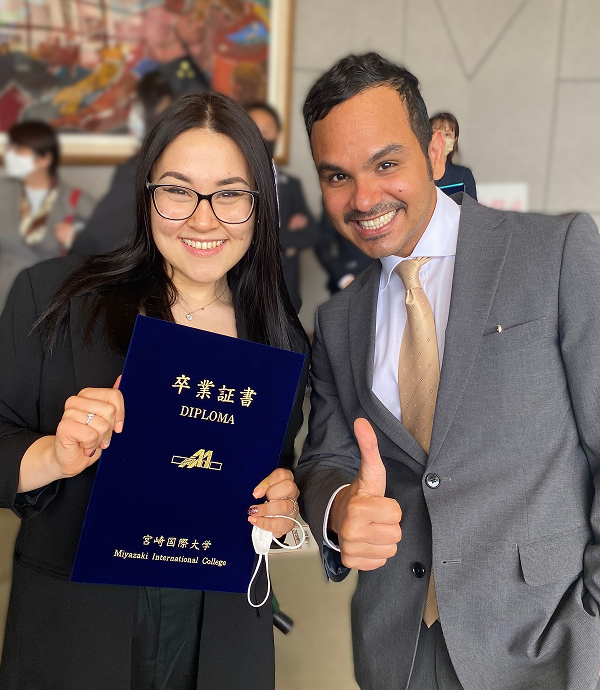
Why did you choose MIU ?
When I graduated from language school, I honestly wasn’t sure yet what I wanted to study or which career path to take. That’s why I chose Liberal Arts — I wanted to explore different fields and give myself the time and flexibility to discover my real interests.
Another important reason I chose MIU was because I wanted to experience life in Japan outside the big city. I felt that living in a quieter, more natural environment would give me a completely different perspective compared to living in a big, busy city. I thought it would be a good chance to focus on my studies, connect more deeply with the local culture, and have a slower, more meaningful lifestyle while I figured out my future direction.
What is your impression of life in Miyazaki compared to life in the city you currently live in ?
Many foreigners who have lived in Japan’s rural communities often mention experiencing feelings of isolation or xenophobia. However, my experience in Miyazaki was the complete opposite. My life there was truly wonderful. I had a great relationship with my manager (tenchō) at my part-time job, and I made close friends who made my time even more enjoyable.
I appreciated the slower pace of life that Miyazaki offered, and when my parents visited, they also fell in love with the area—especially Aoshima. The only challenge I faced was not having a car, which would have allowed me to explore more freely. However, I adapted by using buses and trains, and I never felt restricted.
Living in Miyazaki taught me to embrace a different rhythm of life, and it remains one of the most special experiences I have had in Japan.
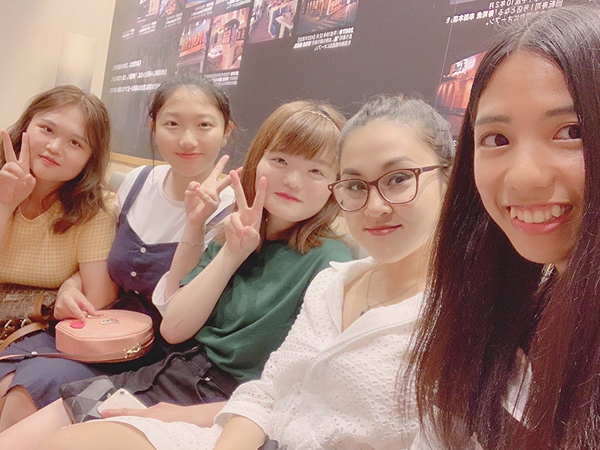
What are the benefits and challenges of the style of learning at MIU ?
One of the best aspects of studying at MIU was the close relationship with my professors and the administrative staff. The community truly felt like a family. Whenever I faced any challenges as a foreigner living in Japan, the administrative team was always ready to support me. In particular, Lloyd-san and Yukiko-san were incredibly helpful with personal matters and made my life in Miyazaki much easier and more comfortable.
As for challenges, living in Miyazaki means that having a car is almost essential if you want to fully explore the prefecture and its beautiful surroundings. Another academic challenge was adjusting to the diverse range of English proficiency among students. For those of us who wanted a more intensive, American-level research experience, it was important to communicate directly with our professors. Thankfully, the faculty were very flexible—professors often provided more advanced readings and assignments to students who were ready for an extra challenge.
Overall, the supportive environment and the flexibility of the academic program made my experience at MIU very rewarding.
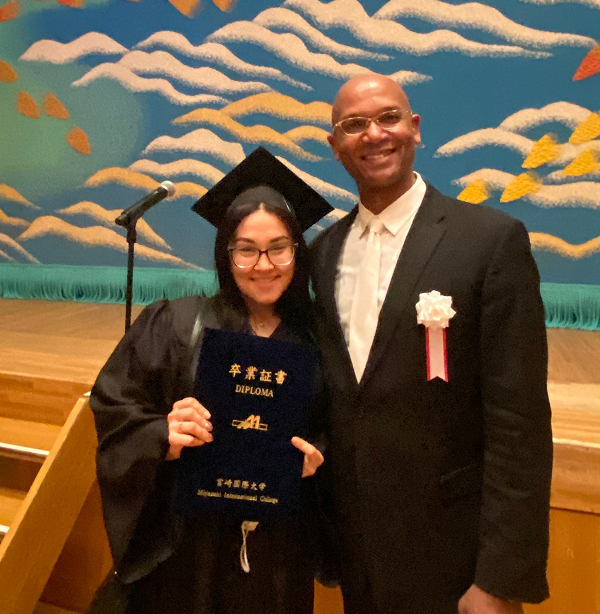
What goals did you set for yourself as a student ?
- Find a job in Japan.
- Read more.
- Develop critical thinking.

What goals did you set for Japanese and English language development ? Have you achieved them ?
At MIU, I set clear goals for my language development in both Japanese and English. For Japanese, my goal was to pass the JLPT N2, which I successfully achieved. I worked closely with Wada-sensei and made an effort to use Japanese in my daily life—whether with friends or during my part-time job—which greatly improved my practical language skills.
For English, I aimed to achieve a high score on the TOEIC exam. I reached this goal through consistent practice, repeatedly working through practice tests, and immersing myself in comprehensive reading to build both speed and accuracy.
What did you gained from university life at MIU ?
At MIU, I gained more than just academic knowledge. I made real friends who supported me during both good and hard times. Being in a small, close community helped me feel like I belonged, even when I was far from home.
The supportive environment, both from the professors and the staff, made it easier to overcome challenges, whether it was about studying or adjusting to life in Japan. I also became more independent and confident in myself, learning how to manage responsibilities, deal with different cultures, and think more critically about the world around me.
The student life at MIU definitely helped shape the person I am today.

What are your dreams and goals for the future?
My long-term goal is to obtain Permanent Residency in Japan and continue building my career in the tourism industry here. I’m especially passionate about promoting tourism in Kyushu, a region I came to love while living there. Kyushu has so much to offer—rich culture, beautiful nature, and unique local experiences—yet it’s often overlooked by international travelers.
Currently, my focus is on developing sustainable tourism in Kyushu by highlighting its hidden gems and encouraging more balanced travel across Japan. I also hope to help reduce over tourism in heavily visited areas like Tokyo, Osaka, and Kyoto by guiding visitors toward equally meaningful but less crowded destinations. Through this, I want to contribute to a more thoughtful and regionally inclusive approach to tourism in Japan.
A message for international students who are considering pursuing graduate studies
Graduate studies can be a challenging but deeply rewarding journey—especially when you’re doing it in a country that’s not your own. My advice to international students is to embrace the experience fully, both academically and personally. Don’t be afraid to reach out for support when you need it—professors and staff can become some of your biggest allies if you let them. In my case, the guidance I received from both MIC and Sophia University helped me stay on track and grow in ways I didn’t expect.
It’s also important to stay open-minded. You might arrive with one idea of what you want to study, but through your classes, professors, and peers, you may discover new interests and perspectives. Take those opportunities seriously—they can shape your future in powerful ways.
Lastly, balance your studies with real-life experiences. Whether it’s through part-time work, volunteering, or daily conversations, being involved in the community around you will not only improve your language skills but also give you a more meaningful connection to your studies and your life in Japan.
